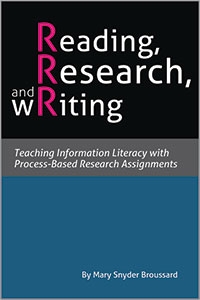
Primary tabs
You don't need to be an ALA Member to purchase from the ALA Store, but you'll be asked to create an online account/profile during the checkout to proceed. This Web Account is for both Members and non-Members.
If you are Tax-Exempt, please verify that your account is currently set up as exempt before placing your order, as our new fulfillment center will need current documentation. Learn how to verify here.
- Description
- Table of Contents
- About the author
The research paper has become so ingrained in higher education that its benefits are assumed to be self-evident, but the connection between student writing and learning is not always clear. Educators frequently discuss the lack of critical thinking demonstrated in undergraduate research papers, but it may not be that students will not invest in writing assignments—it’s possible that many cannot with the educational support currently provided.
Through theory and examples, and with ACRL’s Framework for Information Literacy for Higher Education integrated throughout, Reading, Research, and Writing: Teaching Information Literacy with Process-Based Research Assignments shows just how difficult research assignments can be for novice learners, and offers concrete plans and approaches for building assignments that enhance student learning.
In six chapters—including a final chapter on turning theory into practice—Reading, Research, and Writing is an in-depth, interdisciplinary look at the literature in rhetoric and composition studies, reading comprehension, cognitive psychology, education theory, and library and information science that captures what academic librarians and their teaching faculty collaborators should know about reading and writing to improve undergraduate writing-from-sources assignments. The implications for such an understanding include improving students’ motivation to research, analyze, and synthesize information at a deeper level; improving librarians’ ability to influence effective assignment design among teaching faculty; and opening new avenues of meaningful formative assessment in library instruction.
Information literacy and writing-from-sources are important skills for college graduates who leave formal education to be professionals and, hopefully, lifelong learners. Librarians must examine the broader picture that their piece fits within and work across disciplines to produce truly literate—and therefore information-literate—college graduates.
Acknowledgments
Chapter 1. Why Learn about Reading and Writing?
Why Are Reading and Writing So Hard?
Why Do Librarians Need to Revisit the Research on Reading and Writing?
This Book
Notes
Chapter 2. Theoretical Foundations of Process-Based Information Literacy
Cognitive Needs
Affective Needs
Encouraging Students’ Cognitive and Affective Progress
A Theory of Process-Based Information Literacy
Reflections on Process-Based Information Literacy
Notes
Chapter 3. Informal, Low-Stakes Writing
Process, Creativity, and Low-Stakes Writing
Types of Low-Stakes Writing
Purposes of Low-Stakes Writing
Conclusion
Notes
Chapter 4. Reading for Comprehension and Reading to Write
Meaning Making from Texts
Reading and the Framework
Reading Comprehension Strategies to Teach Students
Conclusion
Notes
Chapter 5. High-Stakes Writing-from-Sources
Assignment Design
Instructional Supports
Conclusion
Notes
Chapter 6. Turning Theory into Practice
Question 1: Is There a Recommended Framework for Implementation That Would Help Librarians Put This Theory into Practice?
Question 2: What Do Librarians Need to Give Up in Order to Move toward a Rhetorical, Process-Based Approach to Information Literacy Instruction?
Question 3: Are There Any Time-Management Strategies to Facilitate Process-Based Information Literacy Instruction?
Question 4: Lifelong Learning and Developing Complex Research Skills over Time Require Students to Transfer Their Information Literacy Skills from One Context to Another. How Do Librarians Teach for Knowledge Transfer?
Question 5: How Do Librarians Manage Change at the Program Level?
Conclusion
Notes
Mary Snyder Broussard
Mary Snyder Broussard is Assistant Professor and Instructional Services Librarian, Coordinator of Reference and Assessment at Lycoming College, Williamsport, Pennsylvania.


